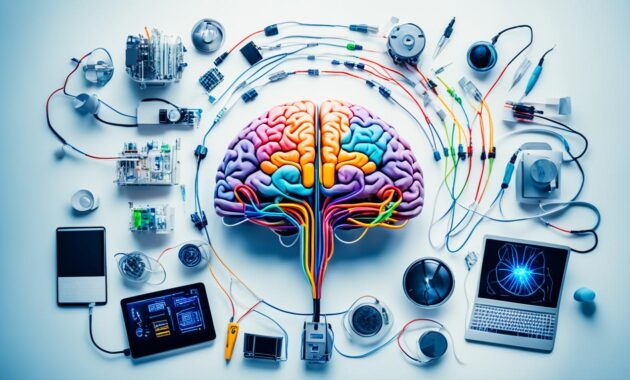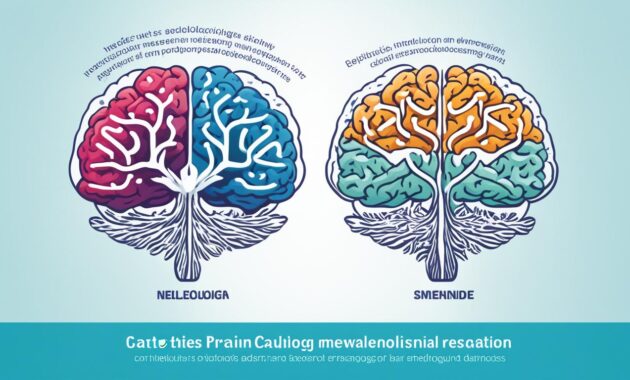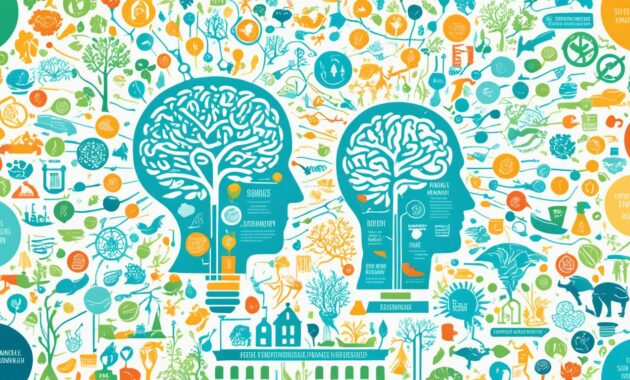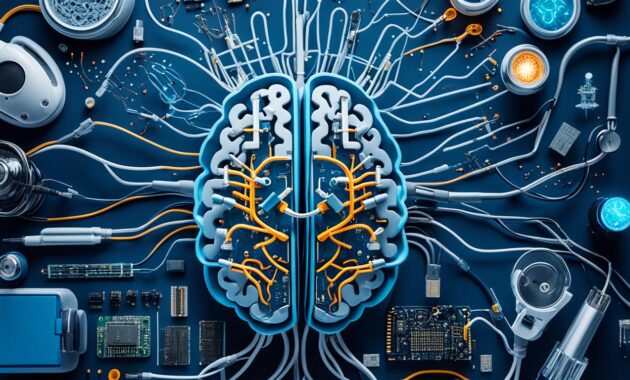Neurology is vital for knowing, diagnosing, and treating brain, spinal cord, and nervous system issues. Neurologists are doctors who are experts in these areas. They help patients keep their brain healthy and improve their lives.
Many people, about one in three, will face a neurological condition at some point. These can be as serious as stroke or Alzheimer’s, or as common as epilepsy and multiple sclerosis. They may cause seizures, tingling, and weakness, affecting how people think and feel.
Neurology services use advanced tests and treatments to help. Neurologists team up with patients, primary care doctors, and other specialists. Together, they make plans to reduce symptoms and improve life quality.
Key Takeaways : Role Of Neurology Services
- Neurological disorders are highly prevalent, affecting at least one in three people during their lifetime.
- Neurology services play a critical role in diagnosing and treating a diverse range of neurological conditions, including stroke, Alzheimer’s disease, epilepsy, and multiple sclerosis.
- Neurologists work closely with patients and healthcare providers to develop personalized treatment plans that can reduce symptoms, slow the progression of chronic conditions, and improve overall quality of life.
- Advances in neuroscience research and emerging technologies are enhancing the capabilities of neurology services to better understand, manage, and prevent neurological disorders.
- Addressing health inequities and promoting access to high-quality neurology services is crucial for ensuring equitable brain health outcomes across diverse populations.
Also Read :The Complete Guide To Aviation Insurance For Aircraft Owners
Understanding the Global Burden of Neurological Disorders
The trouble from neurological disorders is big and keeps getting bigger. This issue is especially concerning in low-income and middle-income countries. From 1990 to 2016, neurological disorders ranked top for disability-adjusted life years (DALYs) and second for deaths worldwide, causing nine million deaths yearly.
The Increasing Prevalence of Neurological Conditions
By 2016, the top conditions causing DALYs globally were stroke (42.2%), headaches (16.3%), dementias (10.4%), meningitis (7.9%), and epilepsy (4.9%). These numbers show that more and more people are facing neurological issues, especially as they get older or due to things like and environmental exposures.
Economic Impact and Costs Associated with Neurological Disorders
The effect of neurological disorders on the economy is big. It leads to high healthcare costs and social costs, affecting disability, mortality, and long-term care needs. OECD countries have also felt the strain on their healthcare systems due to things like their population getting older and an increase in stroke, dementia, and sleep disorders.
| Neurological Disorder | Global DALYs (2016) | Global Deaths (2016) |
|---|---|---|
| Stroke | 42.2% | 67.4% |
| Migraine | 16.3% | N/A |
| Dementias | 10.4% | 20.3% |
| Meningitis | 7.9% | 3.7% |
| Epilepsy | 4.9% | N/A |
To tackle the global burden caused by neurological disorders, we need a broad strategy. It must focus on prevention, early detection, and effective treatment. This is critical, especially in areas where getting good neurology services is hard. And investments in universal health coverage and strengthening health systems can help fight the economic and social costs of these neurological conditions.
Also Read :How Are Bone And Joint Treated By Orthopedic Services?
Role Of Neurology Services

Neurology services are key in diagnosing and treating problems with the brain and nervous system. Neurologists are doctors who focus on these areas. They help people with conditions like stroke, Alzheimer’s, Parkinson’s, and more.
Diagnosis and Management of Neurological Conditions
Neurologists use tests and exams to figure out what’s wrong. Once they know, they help create a plan to treat the issue. This plan might include medicine or surgery.They also work to keep chronic conditions in check. They team up with other health professionals to make sure the treatment is working. This helps improve the patient’s daily life.
Promoting Brain Health Across the Lifespan
Neurologists aren’t just about treating diseases. They’re also big on keeping the brain healthy at all ages. They help spot risks and suggest lifestyle changes to prevent issues.By focusing on more than just treatments, neurologists are vital in improving public brain health around the world.
Also Read :Key Clauses To Know In Disability Insurance Policies
Priority Groups and Populations
The burden of neurological disorders hits some groups harder than others. This shows a big need to fix health unfairness in neurology. These groups may not get to see a neurologist easily. This happens because of money, where they live, and other reasons.
Addressing Health Inequities in Neurology
Neurological disorders affect some groups more than others. Such groups include the poor, minorities, the elderly, and those far from cities. They might not get checked early or treated right, which can make their health worse. Fixing this problem needs many different efforts. We must think about what each group needs to get better. This way, everyone can have a chance to be healthy.
Tailoring Neurology Services for Diverse Communities
It’s key to offer neurology care that meets the needs of different people. This means making sure everyone can get good care, no matter what language they speak or how much money they have. By looking at the bigger picture of health, we can help more people have healthy brains. Neurologists can do a lot to help everyone get the care they need. This can make a big difference for many folks.
Also Read :Steps To Filing A Claim On Your Insurance Policy
The Neurological Quadrangle: A Framework for Action

The neurological quadrangle offers a guide to better brain health and dealing with neurological disorders worldwide. It looks at surveillance, prevention, care, and rehabilitation. It directs efforts in both public health and healthcare upgrades.
Surveillance: Monitoring and Data Collection
Understanding neurological disorders starts with good surveillance and data collection. These help see how common these disorders are and who is mostly affected. By using public health techniques, health systems can better know what’s happening and take focused actions.
Prevention: Addressing Risk Factors and Promoting Healthy Lifestyles
The prevention part focuses on changeable risk factors and backing healthy lifestyles. It means making people aware of brain health and running health programs. It’s about teaming up with different groups to push for seeking care before problems start.
Acute Care: Timely Diagnosis and Treatment
Timely diagnosis and the right treatment matter a lot for neurological disorders. The acute care piece talks about the need for teams that work together. They offer care tailored to the patient. This starts from spotting early signs to using full care plans.
Rehabilitation: Optimizing Function and Quality of Life
Recovery is about reaching the best function and life quality for people with neurological disorders. It uses approaches based on proof, works across different sectors, and ensures everyone gets the care they need. This care not only helps patients but their families too.
Also Read :How Do Physical Therapy Services Benefit Patients?
Integrating Holistic, Spiritual, and Planetary Health

The World Health Organization’s new action plan shines a light on something big. It shows how connecting holistic health, spiritual health, and planetary health is key to facing neurological disorders worldwide. This method sees the mind-body connection, looks at environmental factors and social determinants affecting brain health,and focuses on better well-being and quality of life. It’s all about the big picture.
Working together brings out the best in handling neurological problems. Healthcare workers and patients understand these issues better. This leads to better health for the mind and body. It makes life better for everyone.
To really make a difference on brain health, we need to look at everything. This means thinking green and making sure our communities are healthy. If we act for the planet, we’re helping our brains too.
So, by linking holistic, spiritual, and planetary health, we make good things happen. Doctors, leaders, and you and me can team up. We can take better care of each other and our brains.
The Interconnectedness of Brain Health and Sustainable Development Goals

Understanding the role of brain health is key to the United Nations’ (UN) Sustainable Development Goals (SDGs). These SDGs aim to fight poverty, inequality, and climate change. Brain health is crucial in reaching these goals by improving public policy, and health equality. This leads to progress in fighting major diseases and improving health coverage.
Spending on brain health boosts both personal and community well-being. It helps reach the SDGs focusing on the environment, economy, and building partnerships. Tackling the burden of neurological disorders wisely can greatly boost the economy, social unity, and health overall.
Aligning brain health efforts with the SDGs brings everyone together. It helps policymakers, doctors, and local leaders work in new ways. This teamwork faces tough global issues, supporting public health and sustainable growth. Such an approach is vital for community strength, health fairness, and a better future for everyone.
Building a Broader Coalition of Stakeholders

To achieve better brain health for everyone, we need to unite different groups. These include patients, healthcare providers, policymakers, funders of healthcare, partners who help set plans in motion, and the public. Working together, they offer varied knowledge and insights. This helps us create and put into action strategies. These strategies focus on the patient and work on the worldwide issue of neurological conditions.
The Six Ps: Patients, Providers, Policymakers, Payers, Partners, and Population
Central to our work are the patients. Their needs and stories direct how we provide neurology services. Healthcare teams, made up of neurologists, nurses, and others, give care based on what’s proven to work and what the patient needs.
Policymakers set rules and money flow to make sure people access good care. The money for these services comes from the funders. Community groups and advocates link policies to what actually happens, bringing services where they’re most needed. The wider community sees the results of these combined efforts in their daily lives.
The Quadruple Helix: Academia, Policy, Private Sector, and Population
Expanding our impact also involves the quadruple helix. This model connects schools, rules, businesses, and people. Working together, these sectors stimulate fresh ideas and put them into action. This coordinated effort enhances health systems, delivers care focused on the patient, and hastens our journey toward achieving better brain health for all.
Neurology Services and Emerging Technologies

The American Academy of Neurology is all about making brain health better through new tech. They focus on using digital health and precision medicine to upgrade neurology services. This includes:
Leveraging Digital Health and Precision Medicine
New tech is changing how neurology services work. With telehealth and remote monitoring, patients can use specialized care more easily. They also get treatments tailored to their specific needs, using their own biomarkers and genetic info.
Advancing Neuroscience Research and Innovation
Science in the brain study field is moving fast, thanks to AI and machine learning. These new technologies make clinical trials better and faster. They also help researchers from different fields work together to understand the brain more. This leads to new ways to keep the brain healthy.
Using these new technologies makes neurology services better. This helps patients more and supports the growth of science in brain health.
Enhancing Neurology Workforce and Training
The American Academy of Neurology is working hard to improve the team working on brain health. They see the need for more neurologists to help with brain health. And, they are focusing on working together across different fields.
Addressing Neurologist Shortages
There’s a shortage of neurologists, which is a big issue. To fix this, more training programs are being set up. Also, they are encouraging more professionals to pick neurology as a specialty.
They’re using telehealth to reach more patients, especially in hard-to-reach places. Plus, they’re sharing tasks with other healthcare workers like nurse practitioners. This way, more people can get the care they need.
Promoting Interdisciplinary Collaboration
Building a strong team is key to better patient care in neurology. It’s about neurologists working with different healthcare workers. This mix of professionals makes care plans that fit each patient well.
This also helps in using new technology better. And, it means all healthcare workers keep learning to give the best care. With better training, patients can benefit from the latest in brain research.
Also Read : How To Support Loved Ones In The Hospital – Ways To Provide Comfort And Assistance
FAQs
Q: What is the role of a neurologist?
A: Neurologists diagnose and treat disorders related to the brain or nervous system.
Q: How can a neurologist help individuals?
A: Neurologists diagnose and treat disorders that underlie conditions such as chronic headaches, numbness, reflex issues, and more.
Q: When should I choose to see a neurologist?
A: You should choose to see a neurologist if you have medical issues that require expertise in diagnosing and treating nervous system disorders.
Q: What are the common conditions that neurologists often treat?
A: Neurologists often treat conditions such as Parkinson’s disease, nerve disorders, and other complex neurological issues.
Q: How does a neurologist determine the appropriate treatment for a patient?
A: Neurologists evaluate and measure the individual’s symptoms to determine the best course of action, which may include medications or other specialized care.
Q: In what ways do neurology services enhance brain function?
A: Neurology services help individuals receive expert care to improve brain health, manage neurological conditions, and optimize overall brain function.
Q: Why is it important to have the expertise of a neurologist for certain medical conditions?
A: Neurologists in the United States have specialized knowledge and training to address complex neurological issues that may require a neurologist’s specific care provider.
Source Links
- https://www.aan.com/tools-resources/brain-health
- https://www.ncbi.nlm.nih.gov/pmc/articles/PMC1069062/
- https://www.nature.com/articles/s41582-023-00808-z